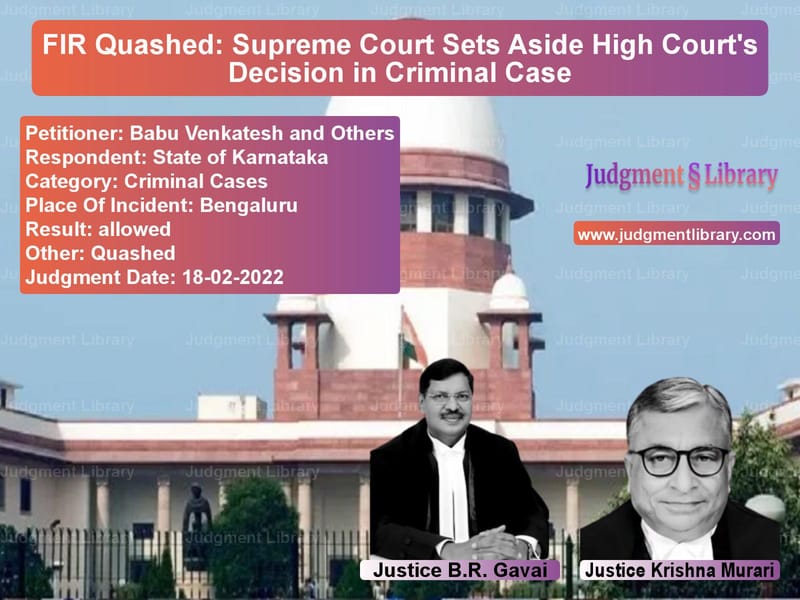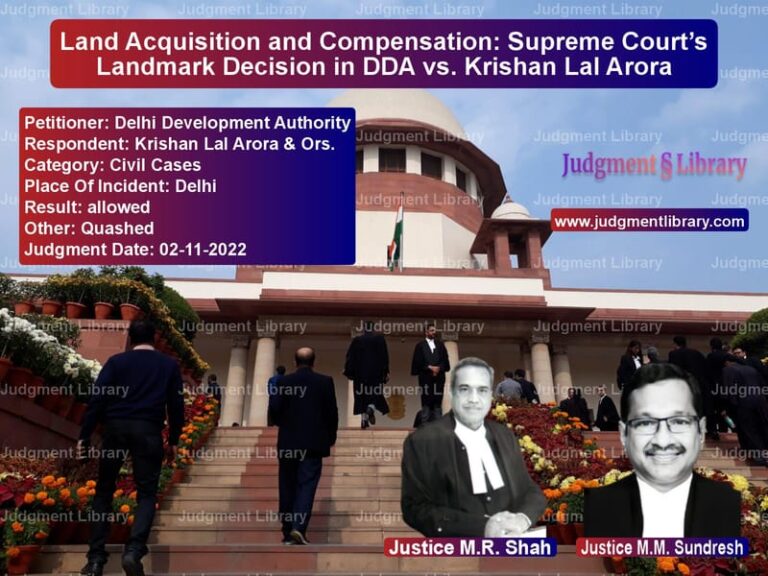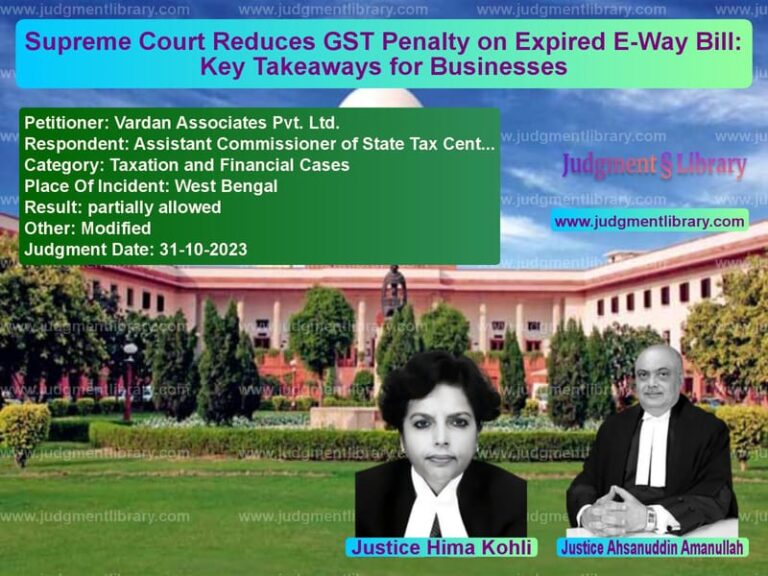FIR Quashed: Supreme Court Sets Aside High Court’s Decision in Criminal Case
The Supreme Court of India, in its judgment dated February 18, 2022, quashed several FIRs filed against the appellants in a cheating and forgery case. The Court held that the continuation of the proceedings would amount to an abuse of the process of law and allowed the appeals filed by the appellants, setting aside the High Court’s decision in the matter.
Background of the Case
The case revolves around a dispute between the appellants, Babu Venkatesh and others, and the respondent, State of Karnataka. The appellants were accused of committing fraud and forgery in relation to a series of property agreements executed between them and the respondent.
The dispute began when the appellants allegedly used blank stamp papers and cheques, which they claimed to have received as security for a loan. However, the respondent alleged that the appellants used these documents to create false agreements for sale and fraudulently obtained money from them.
On the basis of these allegations, the respondent filed multiple FIRs, leading to criminal complaints and investigations. The appellants challenged the FIRs in the High Court, but their petition was dismissed. They then filed an appeal in the Supreme Court.
Legal Proceedings
- September 2019: The respondent filed complaints against the appellants, alleging cheating and forgery in the execution of agreements.
- December 2019: FIRs were registered by the Jayanagar Police Station, Bengaluru, against the appellants under various sections of the Indian Penal Code (IPC), including Section 420 (cheating), Section 465 (forgery), and Section 468 (forgery for purpose of cheating).
- January 2021: The appellants filed petitions under Section 482 of the Cr.P.C. before the High Court, challenging the FIRs and seeking their quashing.
- February 18, 2022: The Supreme Court allowed the appeals, quashing the FIRs and setting aside the High Court’s order.
Arguments Presented
Petitioner’s (Appellants’) Arguments
The appellants contended:
- The FIRs filed by the respondent were based on unsubstantiated allegations and did not constitute a cognizable offense under the IPC.
- The allegations made by the respondent were motivated by personal vendettas and were part of a larger scheme to harass the appellants.
- The criminal complaints filed by the respondent were a disguised attempt to resolve a civil dispute, and the matter should have been handled under civil proceedings rather than criminal law.
Respondent’s (State’s) Arguments
The respondent argued:
- The appellants had committed fraud and forgery by using blank stamp papers and cheques to create false agreements.
- The respondent was misled into entering into agreements under fraudulent circumstances, and the appellants had caused significant financial harm.
- The criminal complaint was filed in good faith, based on legitimate concerns of cheating and misrepresentation.
Supreme Court’s Observations
On the Exercise of Powers Under Section 482 Cr.P.C.
The Court considered the appellants’ request to quash the FIRs and discussed the legal standards for invoking Section 482 of the Cr.P.C., which allows the High Court to quash FIRs:
“FIRs should be quashed if the allegations made do not prima facie constitute any offense or if the proceedings are manifestly an abuse of the process of the law.”
On the Allegations of Cheating and Forgery
The Court assessed the nature of the charges and concluded:
“Although the allegations in the FIR may appear serious, the entire matter seems to stem from a civil dispute. No cogent evidence has been presented to suggest that the appellants intended to defraud the respondent.”
The Court pointed out that mere allegations of fraud in the execution of agreements were not sufficient to establish criminal liability unless there was clear evidence of criminal intent.
On Judicial Prudence and Harassment
The Court noted the possibility of misuse of the criminal law in civil matters:
“The filing of these FIRs appears to be an abuse of the judicial process. It seems that the respondent is resorting to criminal proceedings to settle what appears to be a purely civil dispute.”
Final Judgment
The Supreme Court ruled:
- The appeals were allowed, and the judgments and orders of the High Court were set aside.
- The FIRs registered at Jayanagar Police Station, Bengaluru, were quashed.
- The Court emphasized that the criminal proceedings initiated by the respondent were an abuse of the process of law and should not be pursued further.
Implications of the Judgment
This ruling has significant implications:
- Clarification on Criminal Proceedings in Civil Disputes: The judgment reinforces the principle that criminal law should not be invoked in matters that are essentially civil in nature unless there is clear evidence of a cognizable offense.
- Prevention of Abuse of the Legal Process: It highlights the potential for misuse of criminal proceedings to harass individuals in civil matters, and the Court has provided guidelines for addressing such abuse.
- Importance of Evidentiary Standards: The Court emphasizes the necessity of clear and credible evidence to support criminal allegations of fraud or forgery.
The Supreme Court’s decision strengthens the legal framework by clarifying the boundaries between criminal and civil disputes and ensuring that criminal law is not misused to settle personal grievances.
Petitioner Name: Babu Venkatesh and Others.Respondent Name: State of Karnataka.Judgment By: Justice B.R. Gavai, Justice Krishna Murari.Place Of Incident: Bengaluru.Judgment Date: 18-02-2022.
Don’t miss out on the full details! Download the complete judgment in PDF format below and gain valuable insights instantly!
Download Judgment: babu-venkatesh-and-o-vs-state-of-karnataka-supreme-court-of-india-judgment-dated-18-02-2022.pdf
Directly Download Judgment: Directly download this Judgment
See all petitions in Fraud and Forgery
See all petitions in Bail and Anticipatory Bail
See all petitions in Custodial Deaths and Police Misconduct
See all petitions in Judgment by B R Gavai
See all petitions in Judgment by Krishna Murari
See all petitions in allowed
See all petitions in Quashed
See all petitions in supreme court of India judgments February 2022
See all petitions in 2022 judgments
See all posts in Criminal Cases Category
See all allowed petitions in Criminal Cases Category
See all Dismissed petitions in Criminal Cases Category
See all partially allowed petitions in Criminal Cases Category







